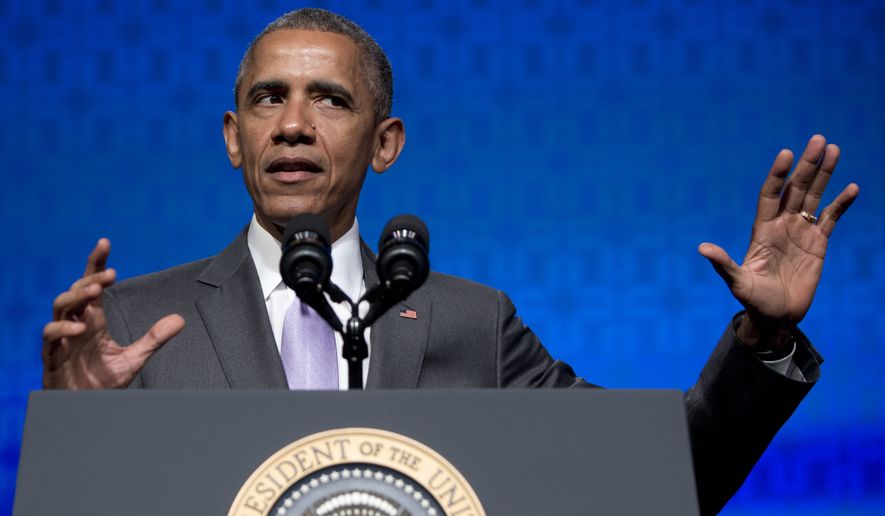The nation’s largest insurer said Thursday it may drop out of Obamacare’s exchanges within two years, adding to a particularly gloomy outlook for the law as it enters its third year of full operation with customers facing rising premiums and the collapse of most nonprofit co-ops.
UnitedHealth Group said it will scale back its marketing for the exchanges in 2016, and will decide by midyear whether it’s worth participating in 2017, as it has seen its expected revenues drop precipitously.
The company now projects earning $425 million less in the fourth quarter of 2015 as customers it had anticipated have failed to sign up for the controversial health law.
“We cannot sustain these losses,” CEO Stephen J. Hemsley told investors. “We can’t really subsidize a marketplace that doesn’t appear, at the moment, to be sustaining itself.”
UnitedHealth insures about 550,000 customers on the Affordable Care Act’s web-based exchanges, where customers who don’t have Medicare or Medicaid or get insurance through their work can shop for coverage.
The company sat out the first year but ramped up participation for 2015, and was bullish as recently as last month.
But the marketplace “did not evolve as quickly as we had hoped,” Mr. Hemsley said, citing sluggish growth in enrollment and claims data that suggested a sicker-than-anticipated customer base whose claims would cost the company more than projected.
The Obama administration was unfazed by the development, arguing it is normal to see changes and adjustments in any new market, and that it fully expects the exchanges to stabilize over time.
“Today’s statement by one issuer is not indicative of the marketplace’s strength and viability,” Health and Human Services Department spokesman Ben Wakana said.
Still, the withdrawal of a large industry player would be a heavy blow to the Affordable Care Act, which kicked off its third enrollment period on Nov. 1 and faces a series of challenges, from rising premiums in some parts of the country to the failure of more than half of the initial 23 nonprofit co-op plans designed to foster competition in the marketplace.
Congress is already worried that two proposed mergers — Anthem with Cigna and Aetna with Humana — will reduce competition, and UnitedHealth’s withdrawal would amplify those concerns.
“It seems the news for the president’s health law gets worse by the day, and the public is paying the price,” said Energy and Commerce Committee Chairman Fred Upton, Michigan Republican. “UnitedHealth Group is a very large piece of the Obamacare Jenga tower — and with the many broken promises, growing rate shock and failed co-ops, the law is already on shaky ground.”
HHS estimates that just 10 million Americans will sign up for plans on the health care exchanges for next year, a small increase over the 9 million-plus enrollees it attracted for 2015 and far short of the 21 million that budget analysts initially projected.
Many customers have stayed away because Obamacare’s tax penalty, levied on those who refuse to get insurance, hasn’t changed behavior as much as expected. And for those making at least 200 percent of the poverty level, the government tax credits aren’t generous enough to make the plans worthwhile, according to a study released Thursday by the Mercatus Center at George Mason University.
As a result, insurers took on more risk than they bargained for.
“United’s announcement underscores the continued evolution and uncertainty associated with the nascent exchange market. Over time it will be critical for exchanges to continue to attract, retain and grow enrollment to sustain issuer participation,” said Elizabeth Carpenter, a vice president at the Avalere Health consultancy in Washington, D.C.
Undeterred, the administration said it is buoyed by early returns in the 2016 enrollment period that lasts until Jan. 31.
More than 1 million people have selected plans so far — though two thirds were returning customers — and an average of 10 insurers are participating in each state’s exchange for 2016, compared to nine in 2015 and eight in 2014.
“The reality is we continue to see more people signing up for health insurance and more issuers entering the marketplaces and, at the end of January, we believe we’ll be looking at another successful open enrollment — just like the last two,” Mr. Wakana said.
UnitedHealth, however, said it has had a “deteriorating experience” with the exchanges so far, citing weak growth that is unlikely to improve.
“These indicators point to an environment that is declining and likely to continue in that direction into next year,” Mr. Hemsley told investors. “And we see no data pointing to improvement, which is why we are announcing this proactive step.”
• Tom Howell Jr. can be reached at thowell@washingtontimes.com.




Please read our comment policy before commenting.